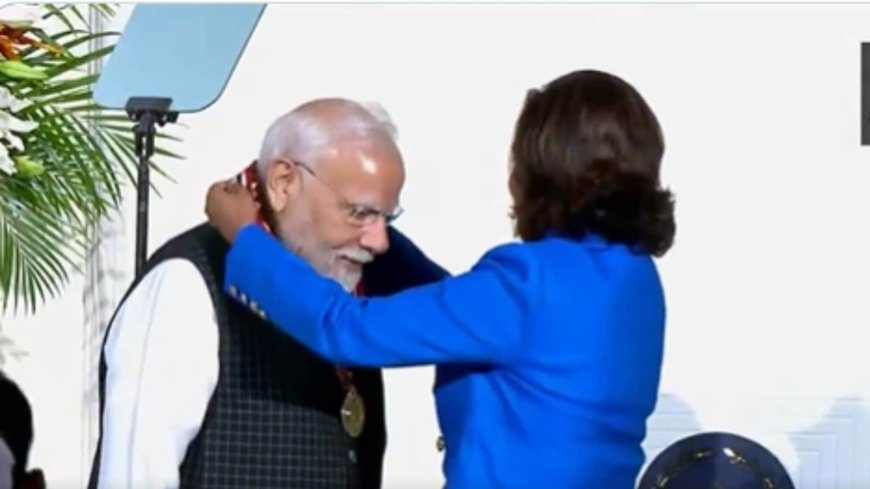PM Modi Honoured with Trinidad & Tobago’s Highest Civilian Award During Landmark Overseas Tour
Prime Minister Narendra Modi was awarded the Order of the Republic of Trinidad & Tobago during his landmark overseas tour, marking a major step in India-Caribbean relations.

Port of Spain / New Delhi, July 5, 2025 — Prime Minister Narendra Modi’s latest overseas diplomatic mission has taken a historic turn, as he was awarded Trinidad & Tobago’s highest civilian honour, the Order of the Republic of Trinidad and Tobago (ORTT), during his visit this week. The rare recognition marks a new chapter in India’s growing global stature, and reflects the strengthening of Indo-Caribbean ties, especially with nations that host significant Indian diaspora populations.
PM Modi's high-profile tour to the Caribbean nation is part of a broader multilateral diplomatic strategy, aimed at deepening economic, cultural, and geopolitical cooperation with countries outside India’s traditional spheres of engagement. The trip comes at a critical moment for India, as it navigates global leadership ambitions, increasing its presence in the Global South, and preparing for multiple regional summits in the latter half of 2025.
The Honour: Symbol of Diaspora Diplomacy and Shared Values
During a grand ceremonial event held at the President’s House in Port of Spain, Trinidad & Tobago’s President Christine Kangaloo conferred the ORTT on Prime Minister Modi for his “transformative global leadership, commitment to democratic values, and unparalleled outreach to the Indian diaspora.”
Only a handful of global leaders have received this prestigious award. The citation described Modi as “a global statesman whose inclusive leadership has inspired millions and fortified civilizational ties across continents.”
This recognition is also deeply symbolic—Trinidad & Tobago is home to a vibrant Indo-Caribbean population, many of whom trace their ancestry to indentured laborers from India during the 19th century. PM Modi’s outreach to such communities underlines India’s soft power diplomacy, connecting heritage and development in a single framework.
Highlights of PM Modi’s Trinidad & Tobago Visit
Modi’s two-day itinerary was packed with bilateral and multilateral engagements, focusing on strategic cooperation in:
-
Trade and Investment: The two nations signed agreements to promote digital trade, green energy partnerships, and mutual tax compliance mechanisms.
-
Maritime Cooperation: In view of increasing Chinese presence in the Caribbean, India offered to support coastal surveillance systems and port infrastructure upgrades.
-
Cultural Exchange: A new “Indo-Caribbean Cultural Corridor” was announced, linking universities and cultural institutions across both countries.
-
Diaspora Engagement: PM Modi addressed a massive gathering of over 40,000 Indian-origin citizens in Port of Spain, describing them as “the living bridge between India and Trinidad & Tobago.”
Speaking at the diaspora event, Modi said:
“You may be far in miles, but never in memory. The heritage we share binds us across oceans and generations.”
Strategic Dimensions: Why the Caribbean Matters Now
India’s engagement with Trinidad & Tobago is part of its broader pivot towards Latin America and the Caribbean (LAC). With the world order increasingly shaped by energy transitions, maritime security, and global trade realignments, nations like Trinidad & Tobago—which sit at strategic trade corridors and possess large natural gas reserves—are emerging as critical partners.
India’s growing demand for clean energy and its desire to secure non-traditional energy sources gives further importance to this relationship. Talks are already underway to explore LNG (Liquefied Natural Gas) cooperation and joint research into green hydrogen development.
Furthermore, India’s increased involvement in CARICOM (Caribbean Community), where it is now a development partner, opens new diplomatic channels. This visit served as a launchpad for India-Caribbean Development Fund (ICDF)—a proposed $300 million initiative to support renewable infrastructure, disaster resilience, and educational scholarships.
Opposition and Criticism at Home
Back in India, the visit wasn’t without political reactions. Opposition leaders questioned the timing of the foreign tour, especially with domestic issues such as inflation and unemployment still dominating headlines. Congress spokesperson Pawan Khera remarked:
“Modi’s tour may be grand, but India needs leadership at home. The honour is welcome, but what about honouring the constitutional promises made to Indians first?”
However, government supporters argue that global diplomacy is essential to India’s rise as a major power, and Modi’s personal diplomacy has consistently yielded results—be it vaccine diplomacy during the pandemic or securing strategic partnerships in the Indo-Pacific and beyond.
The Bigger Picture: India’s Expanding Global Footprint
PM Modi’s tour to Trinidad & Tobago adds to a long list of recent high-impact diplomatic visits, including engagements with African Union, UAE, Brazil, and ASEAN countries. India’s foreign policy under Modi has focused heavily on multi-alignment—a model that allows cooperation with multiple global powers while retaining strategic autonomy.
In this context, small but symbolically important nations like Trinidad & Tobago become valuable allies in forums such as:
-
United Nations General Assembly (UNGA)
-
Commonwealth of Nations
-
International Solar Alliance (ISA)
-
G20 Partner Outreach Programs
With the 2025 BRICS+ Summit scheduled in November and India’s expected leadership role in several upcoming multilateral dialogues, the PM’s visit is likely to influence coalition-building efforts across the Global South.
Conclusion: A Visit Rich in Symbolism, Strategy, and Soft Power
PM Narendra Modi’s reception in Trinidad & Tobago is more than just a diplomatic event—it is a carefully calibrated gesture of global engagement, drawing on India’s rich diaspora connections, expanding economic partnerships, and reinforcing its image as a responsible power.
While domestic critics question the optics, there is no denying that this visit has strengthened India’s global narrative—as a country that respects its roots while seeking a stronger role on the world stage.
As the Prime Minister prepares to continue his overseas tour to Suriname and Guyana, all eyes are now on how India will turn these symbolic victories into sustained geopolitical influence.














